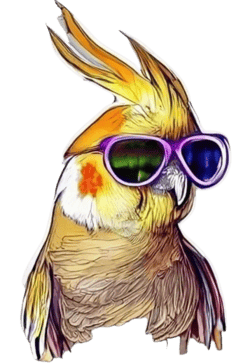Cockatiel’s Age – The Mystery Unraveled: How to Tell How Old a Cockatiel Is
I. Introduction
Brief Overview on Cockatiels
Cockatiels are undeniably one of the most relished companions in the world of pet birds. Embodying an irresistible charm with their comically crested heads and chirpy personalities, these Australian natives have captured the hearts of bird lovers globally.
Importance of Knowing a Cockatiel’s Age
Having a clear idea about your cockatiel’s age can help in many ways. It enables you to provide them with age-appropriate care, diet, and exercise, and anticipate potential health issues that they may encounter at varied stages in their lives.
Presentation of the Age Determination Mystery
Determining a Cockatiel’s age can be tricky. Unlike us humans who are pretty open about our ages (well, most of us!), cockatiels don’t carry their dates of birth on their feathered sleeves. Let’s unwrap this mystery together!
II. Understanding Cockatiel Lifespan and Aging
General Lifespan of Cockatiels
On average, a healthy and well-cared cockatiel could live between 15 and 20 years. Some exceptionally spry birds can even celebrate their 25th bird-day!
Factors Influencing Cockatiel’s Lifespan
Several factors influence a Cockatiel’s lifespan, including diet, exercise, environmental conditions, and genetics.
Aging Process and Differences in Cockatiels
Just like humans, cockatiels age at their own pace, and they show this through a host of physical and behavioral changes.
III. Physical Clues in Determining a Cockatiel’s Age

Eye Color Changes on Cockatiel Age
In young cockatiels, eye color is generally dark-gray or black. As they age, this color transitions to a lighter gray or even stony color.
Feather Color and Pattern Alterations
Feather color in cockatiels also offers age clues. Young cockatiels often sport dull and mottled plumage, while adults boast vibrant, smooth feathers.
Size and Shape of Cockatiel as Age Indicators
Cockatiels stop growing after about a year. Therefore, if your friend is small and has a round appearance, chances are they’re still a youngster.
IV. Behavioral Signs to Discern a Cockatiel’s Age
Behavioral Changes Associated with Maturation
Young cockatiels often display clumsy and goofy behaviors. As birds mature, they grow into their feathers and become more coordinated and graceful.
Understanding Age-related Cockatiel Communication Patterns
Elderly cockatiels may showcase increased vocalization or repeat certain sounds or actions—an indication that they’re calling the nest ‘home sweet home’!
Shift in Activity Levels with Age
Young cockatiels are bustling with energy, while older ones tend to be more serene yet remain active within their comfort zone.
V. Other Approaches to Determine a Cockatiel’s Age
Veterinary Examination for Age Estimation
A vet’s examination can give approximate age data by assessing the bird’s overall health, bone structure, and other physiological aspects.
Clues from the Cockatiel’s Past and History
Knowing the bird’s history can be beneficial. Rescue centers and previous owners may share useful information about the bird’s age.
Limitations in Age Determination
Remember, these methods provide only estimates. The exact age of a cockatiel can still remain uncertain, especially if it’s well-cared and in prime health.
VI. Care Tips Based on Cockatiel’s Age

Proper Diet and Feeding Based on Age
Young cockatiels need a diet rich in proteins for growth, while older ones require balanced nutrition to maintain their health.
Vitality and Exercise for Different Age Groups
Youngsters should be encouraged to fly and play for muscular development, whereas older birds need moderate exercise to stay fit without overexertion.
Age-specific Health Checks and Precautions
Regular vet check-ups are critical. Young birds may need vaccinations, while older ones might require screenings for age-related issues.
VII. Conclusion
Recap of Key Points on How to Tell a Cockatiel’s Age
Unraveling a cockatiel’s age might be a complicated affair, but informed guesses can be made by observing physical characteristics, behavioral changes, and with professional assistance.
Affirmation on the Value of Understanding a Cockatiel’s Age
Knowing your feathered friend’s age is an essential step in offering them a healthy, happy, and long life you both can cherish.
If you’re curious about the vocal capabilities of your cockatiel, especially the intriguing question of whether a female cockatiel can talk, check out our article for insights into the communication skills of these delightful birds. Understanding their unique features adds another layer to the joy of caring for your avian companion.
VIII. FAQs
- How Accurate are these Age Determination Techniques?
The accuracy can vary. For a precise estimate, a vet examination is ideal.- Will a Cockatiel’s Behavior Change Dramatically as it Ages?
Just like humans, aging cockatiels may slow down and become less active, but they usually retain their unique personality traits.- Are There Risks in Misjudging a Cockatiel’s Age?
Misjudging a cockatiel’s age could lead to inappropriate care based on the bird’s actual requirements. It’s always best to consult with a vet if unsure.- How will Knowing a Cockatiel’s Age Improve its Care?
It helps in providing age-appropriate nutrition, exercise, and health-checkups, ensuring your pet lives a full, healthy life.- What to do if Unable to Figure Out a Cockatiel’s Age?
When in doubt, always consult with a vet or an avian specialist. They can help you understand your pet better and provide suitable care.

About Me
I’m Kamran, a co-founder and content creator at cockatielhq.com. With 8+ years in the world of avian enthusiasts, I’ve gained extensive knowledge in caring for birds. From egg-laying and mating to cohabitation with other birds, dietary needs, nurturing, and breeding, I’m here at cockatielhq.com to share valuable insights for your avian companions.








One Comment